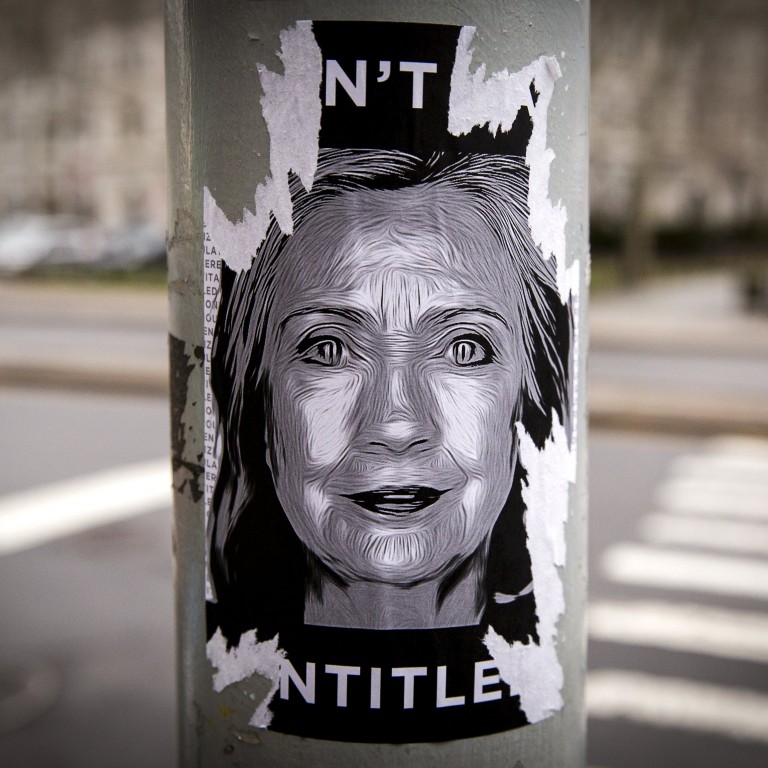
Hillary Clinton: yesterday's candidate, tomorrow's president?
Kevin Rafferty says serious cash will be spent and political favours traded as 2016 election nears
Hillary Clinton finally confirmed this week what the rest of the world had known for more than two years - she is off and running to become the United States' first woman president next year.
Precisely one minute 35 seconds into a 2:18 commercial featuring more than a dozen different Americans, African-Americans, Hispanics, Asians, old folks ready to retire, young people seeking a first job, workers in garden and factory, gays planning marriage, Clinton appeared and faced the camera to announce, "I'm running for president".
With considerable chutzpah, she continued, "Americans have fought their way back from tough economic times but the deck is still stacked in favour of those at the top. Everyday Americans need a champion, and I'm going to be that champion."
America faces more than 560 days in which billions of dollars will be thrown about in the greatest political bonanza on earth, so that over 200 million Americans can cast their votes for one of two candidates ordained by the giant party machines.
Commentators are already speculating that it will be a rerun of the old dynastic contest, Clinton (Hillary) versus Bush (Jeb). What's democratic about that, Hong Kong might ask!
It's democratic in that before the big party machines choose, 40 to 50 hopefuls will enter the lists. In 2008, when a fresh president was to be chosen since incumbent George W. Bush could not run again, there were 13 lists of names on the presidential ballot, and 34 people contested primaries.
Ordinary people get to have a say through opinion polls that refine the candidates, and through unpredictable state primary contests that prevent the choices being made in the legendary smoke-filled party backrooms.
It's democratic in that Clinton, haughty millionaire empress of all she surveyed, according to critics who noted that she demands the presidential suite in hotels, six-figure fees for speeches and a Gulfstream jet to travel there, will have to go to the people and beg for their votes.
Clinton immediately set off on a road trip to small-town America to meet the kind of ordinary folk who were the stars of her video.
But it is a dangerous democracy that depends on dynasties. Having got rid of their king more than two centuries ago, Americans have shown an undue affection for dynasties, starting with John Adams, the second president, whose son John Quincy Adams became the sixth president. Wikipedia lists 88 American dynastic political families beginning with the letter "A" alone.
The Bush-Clinton dynastic battle for the presidency has already run for more than two decades, stretching back to 1992 when George H. W. Bush lost the election to Bill Clinton. It could run and run if Chelsea Clinton, and George P. Bush, son of Jeb, continue with their budding political careers.
It is even more dangerous that American democracy depends on money. Clinton alone, election pundits predict, will have more than US$1 billion at her disposal.
Money politics causes pernicious and cumulative damage. Critics complain that Obama is just as much indebted to rich financial interests as any Republican. He went to Wall Street for his financial team, just as Bill Clinton had. Mega-finance interests have managed to undermine measures taken to prevent a repeat of the 2008 financial crisis.
Equally dangerous, election fever creates a crazy populism, which cannot test or measure the capability of the candidates to cope with the myriad pressures of the actual job of president, involving tedious administration, massaging Congress, dealing with difficult friends and obstructive foes big and small, all simultaneously.
Some political scientists claim China's leadership testing system is superior: by the time that a Chinese leader climbs to the top of the greasy political pole, he will already have proved himself in running a province the equivalent of a medium-sized country outside China.
Hillary Clinton has the name, the money and vast experience of high office. She learned the hard way, especially in dealing with China, the vast gulfs between your ideals, such as free speech and human rights for all, and what may realistically be achievable and what you can get.
The Democratic nomination is hers to lose, given her vast war chest. But she will be 69 by the time of the election and comes with baggage that Republicans are already exploiting, including her use of personal e-mails for government business when secretary of state.
David Stockman, former budget director under Ronald Reagan, called Clinton, "the class president of a failed generation". Marco Rubio, Republican senator, who declared his own presidential candidacy for 2016, derided her as the candidate of yesterday. Clinton is certainly determined to prove that she is not yesterday's woman, but, ultimately, the US people will decide.

